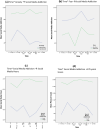Social media addiction and emotions during the disaster recovery period-The moderating role of post-COVID timing
- PMID: 36264854
- PMCID: PMC9584413
- DOI: 10.1371/journal.pone.0274898
Social media addiction and emotions during the disaster recovery period-The moderating role of post-COVID timing
Abstract
Background: Social media addiction, a recently emerged term in medical science, has attracted the attention of researchers because of its significant physical and psychological effects on its users. The issue has attracted more attention during the COVID era because negative emotions (e.g., anxiety and fear) generated from the COVID pandemic may have increased social media addiction. Therefore, the present study investigates the role of negative emotions and social media addiction (SMA) on health problems during and after the COVID lockdown.
Methods: A survey was conducted with 2926 participants aged between 25 and 45 years from all eight divisions of Bangladesh. The data collection period was between 2nd September- 13th October, 2020. Partial Least Square Structural Equation Modelling (PLS-SEM) was conducted for data analysis by controlling the respondents' working time, leisure time, gender, education, and age.
Results: Our study showed that social media addiction and time spent on social media impact health. Interestingly, while anxiety about COVID increased social media addition, fear about COIVD reduced social media addition. Among all considered factors, long working hours contributed most to people's health issues, and its impact on social media addiction and hours was much higher than negative emotions. Furthermore, females were less addicted to social media and faced less health challenges than males.
Conclusion: The impacts of negative emotions generated by the COVID disaster on social media addiction and health issues should be reconsidered. Government and employers control people's working time, and stress should be a priority to solve people's social media addiction-related issues.
Conflict of interest statement
The authors have declared that no competing interests exist.
Figures
References
-
- Internetworldstats.com. [cited 2022 July 15]. http://www.internetworldstats.com/emarketing.htm.
-
- Kemp S. Digital 2022: Bangladesh. In: DataReportal–Global Digital Insights [Internet]. 15 Feb 2022 [cited 15 Jul 2022]. https://datareportal.com/reports/digital-2022-bangladesh
-
- Sushama C, Kumar MS, Neelima P. Privacy and security issues in the future: A social media. Materials Today: Proceedings. 2021. Jan 7.
-
- Laguna L, Fiszman S, Puerta P, Chaya C, Tárrega A. The impact of COVID-19 lockdown on food priorities. Results from a preliminary study using social media and an online survey with Spanish consumers. Food quality and preference. 2020. Dec 1;86:104028. doi: 10.1016/j.foodqual.2020.104028 - DOI - PMC - PubMed
-
- Barrett-Maitland N, Lynch J. Social media, ethics and the privacy paradox. InSecurity and privacy from a legal, ethical, and technical perspective 2020 Feb 5. IntechOpen.
MeSH terms
LinkOut - more resources
Full Text Sources
Medical




